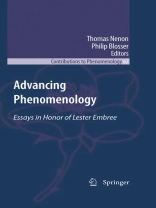Philip Blosser and Thomas Nenon The essays in the volume were assembled in honor of Lester Embree, who celebrated his 70th birthday on January 9, 2008. A preview of this volume was presented to Professor Embree at a reception sponsored by the Center for Advanced Research in Phenomenology that was held in his honor at the 2008 meeting of the Husserl Circle at Marquette University in Milwaukee, Wisconsin. The title Advancing Phenomenology is purposely ambiguous. On the one hand, these essays document the progress that phenomenology as an ongoing and vibrant movement has made in the period of over a century since its inception. They ill- trate the advance of phenomenology both in terms of the range of topics represented in this volume and in terms of the disciplinary and geographical diversity of the scholars who have contributed to it. The topics range from scholarly appropriations of past achievements in phenomenology, to concrete phenomenological investi- tions into ethics, gender, and environmental philosophy, as well as phenomenolo- cal reflections on the foundations of disciplines outside philosophy such as psychology, history, the social sciences, and archeology. The contributors come both from philosophy departments and from a number disciplines outside of philosophy such as sociology, psychology, and archeology; and they come from all around the world – from North America, from Western and Eastern Europe, from Latin America, and from several different countries in Asia.
Cuprins
The Backdrop to Husserl’s Phenomenology.- Naturalism, Historism, and Phenomenology.- Husserl’s Phenomenological Philosophy.- How Is Phenomenology Motivated?.- Working Notions: A Meditation on Husserlian Phenomenological Practice.- Percept, Concept, and the Stratification of Ideality.- Focusing and Phenomenology.- Quo Vadis, Phenomenology?.- Toward a Husserlian Conception of Epistemology.- Perception as a Source of Justification of Belief.- The Worldhood of the World and the Worldly Character of Objects in Husserl.- Thinking of Difference and Otherness from a Husserlian Perspective.- Husserl and His Philosophical Successors.- Husserl and Merleau-Ponty on Embodied Experience.- Making the Case for Gestalt Organization: Edmund Husserl and Aron Gurwitsch on the Problem of Independent Parts.- Phenomenology of Surprise.- The Crisis of Modern Society and Critical Rationality.- Can a Schelerian Ethic Be Grounded in the Heart without Losing Its Head?.- Phenomenology Beyond Philosophy.- A Phenomenological Reflection Conducted Through Narrative: An Essay in Honor of Lester Embree.- The Participating Professional.- Phenomenological Overcoming of Western Prejudices against Nonhuman Animals.- Ecophenomenology and the Resistance of Nature.- Reflections on the Ecological Crisis and the Meaning of Nature.- Modern Technology and the Flight from Architecture.- Reflections on Metaarchaeology.- Objective Meaning and Subjective Meaning: A Clarification of Schutz’s Point of View.- Methodology of the Social Sciences Is Where the Social Scientists, Philosophers and the Persons on the Street Should Meet.- Phenomenological Philosophy and Analytic Philosophy.- Phenomenological Wissenschaftslehre and John Mc Dowell’s Quietism.- Essays and Documents on Lester Embree’s Contributions to Phenomenology.- Advancing Phenomenology as a Practical Endeavor.- A Letter of Dorion Cairns.- Curriculum Vitae.
Despre autor
Philip Blosser is Professor of Philosophy at Sacred Heart Major Seminary in Detroit, Michigan. Born in China and raised in Japan, he is a graduate of Sophia University in Tokyo and with Master’s degrees from Westminster Theological Seminary (Religious Studies) Villanova University (Philosophy), and a Ph D from Duquesne University (Philosophy). He previously taught at Duquesne University, Lenoir-Rhyne University, and Harlaxton College in England. His publications include numerous articles as well as books, including Japanese and Western Phenomenology (1993), Scheler’s Critique of Kant’s Ethics (1995), Of Friendship: Philosophic Selections on a Perennial Concern, co-edited with Marshell Carl Bradley (2nd ed., 2002). At present he is working on a book on the phenomenology of the moral conscience. Thomas Nenon (Ph D, University of Freiburg) is Professor of Philosophy and Vice Provost for Assessment, Institutional Research, and Reporting at the University of Memphis. He worked as an editor at the Husserl-Archives and instructor at the University of Freiburg before coming to University of Memphis. His teaching and research interests include Husserl, Heidegger, Kant and German Idealism, Hermeneutics, and the philosophy of the social sciences and has published numerous articles in those areas as well as the book Objektivität und endliche Erkenntnis (Freiburg: Alber, 1986) and as co-editor (along with Hans Rainer Sepp) volumes XXV and XXVII of the Husserliana. He has served as review editor for Husserl Studies, as a member of the Executive Committee of the Society for Phenomenology and Existential Philosophy, and as Director of the Center for the Humanities. His current research interests include Husserl’s theories of personhood and subjectivity and Kant and Hegel’s practical philosophy.












